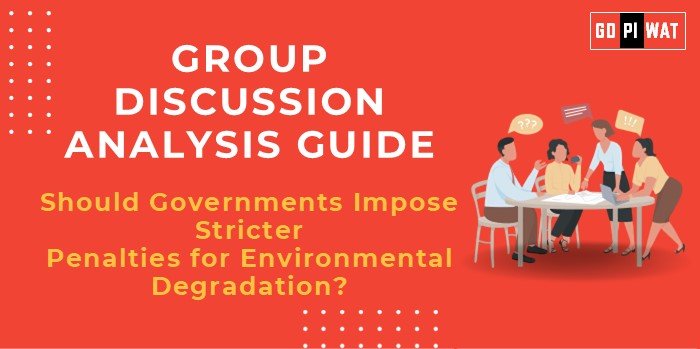🌍 Group Discussion (GD) Analysis Guide
Should Governments Impose Stricter Penalties for Environmental Degradation?
📋 Introduction to the Topic
Opening Context: Environmental degradation is a critical issue affecting global ecosystems, economies, and public health. Governments worldwide face increasing pressure to enforce stronger penalties to deter harmful practices.
Topic Background: From rising greenhouse gas emissions to widespread deforestation and pollution, environmental degradation has escalated over the decades. In recent years, countries like Germany and Japan have implemented strict environmental policies, highlighting the global trend toward sustainability.
📊 Quick Facts and Key Statistics
- Global Deforestation Rate: 10 million hectares annually (FAO, 2023) – impacts biodiversity and climate regulation.
- Ocean Pollution: 12 million tons of plastic waste enter oceans annually (UNEP, 2023).
- Economic Cost of Degradation: $6 trillion/year globally (World Bank, 2022).
- Carbon Emissions Penalty in EU: €100 per ton of CO₂ (2024).
🔑 Stakeholders and Their Roles
- Governments: Enforce regulations, levy penalties, and promote sustainable practices.
- Corporates: Transition to eco-friendly operations and ensure compliance.
- Citizens: Advocate for sustainability and adopt green habits.
- NGOs & International Bodies: Monitor practices, raise awareness, and offer solutions.
✅ Achievements and Challenges
Achievements:
- EU’s Carbon Pricing Model: Reduced emissions by 20% since 2005.
- Plastic Bans: Kenya and Rwanda reported a 70% reduction in plastic waste after implementing bans.
- Afforestation Drives: India added 2 million hectares of forest cover in the last decade.
Challenges:
- Implementation Gaps: Weak enforcement in developing nations.
- Economic Pressures: Resistance from industries fearing financial losses.
- Global Comparisons: China’s rapid industrialization versus stringent EU regulations.
🛠️ Structured Arguments for Discussion
- Supporting Stance: “Stricter penalties create financial deterrents, encouraging industries to adopt greener practices.”
- Opposing Stance: “Penalties increase operational costs, disproportionately affecting small businesses.”
- Balanced Perspective: “While stricter penalties are essential, they should be paired with incentives for sustainable practices.”
💡 Effective Discussion Approaches
Opening Approaches:
- Highlight a statistic: “The $6 trillion annual economic cost of environmental degradation calls for urgent measures.”
- Start with a question: “Can strict penalties balance economic growth with environmental conservation?”
Counter-Argument Handling:
- Recognize resistance from businesses, and propose subsidies for compliance.
- Cite success stories like Norway’s eco-tax model reducing emissions by 30%.
📈 Strategic Analysis: SWOT
- Strengths: Drives innovation in sustainability; global consensus on urgency.
- Weaknesses: Implementation gaps, bureaucratic inefficiencies.
- Opportunities: Public-private partnerships, technological advancements.
- Threats: Political opposition, economic instability.
📚 Connecting with B-School Applications
- Real-World Applications: Policies in operations management and CSR programs.
- Sample Questions:
- “How can stricter penalties impact business innovation?”
- “Discuss the economic implications of environmental penalties.”
- Insights for B-School Students: Understanding regulatory impact on industries prepares students for leadership roles in sustainable practices.


